Overview
Securing a UK mortgage as a non-resident presents unique challenges, including increased deposit requirements, stringent eligibility criteria, and a complex application process. These hurdles often necessitate specialized guidance. This article illustrates these challenges through compelling case studies and expert insights, emphasizing the critical need for tailored financial solutions. Furthermore, it highlights the pivotal role of mortgage brokers in assisting non-residents to successfully navigate the financing landscape.
Introduction
In the dynamic realm of property investment, non-residents eyeing the UK market encounter a landscape rich with both opportunities and challenges. With mortgage requirements that diverge significantly from those applicable to UK residents, grasping the intricacies of securing financing is paramount. From navigating stringent deposit expectations to contending with complex eligibility criteria, potential buyers must be well-informed to make sound financial decisions.
As interest in the UK property market escalates among international investors, the necessity for expert guidance becomes increasingly vital. This article explores the unique aspects of UK mortgages for non-residents, providing insights into the application process, financial considerations, and the significance of leveraging specialized mortgage brokers to unlock the door to successful property ownership.
Understanding UK Mortgages for Non-Residents
UK mortgage non-resident options cater to individuals living abroad who are interested in acquiring property within the country. These options often present distinct differences compared to those available to UK residents, primarily due to heightened requirements for deposits and eligibility criteria. In 2025, individuals classified as UK mortgage non-residents generally face average deposit requirements between 25% and 40% of the property's value, indicating the heightened risk recognized by financial institutions.
Obstacles encountered by non-residents include:
- Restricted access to specific financing sources
- Narrowing choices resulting in elevated interest rates
Many financial institutions require additional documentation to verify income and financial stability, complicating the application process. Furthermore, non-residents looking to secure a UK mortgage often navigate a complex landscape of regulations and requirements that can vary significantly from one financial institution to another.
Case studies effectively illustrate these challenges. For instance, a recent client of Finance Story, an Irish national seeking to purchase a buy-to-let property in London, faced initial hurdles due to stringent deposit requirements and limited lender options. However, with Finance Story's personalized guidance and specialized expertise in expat loans, the client secured a home loan with a competitive interest rate, demonstrating the importance of tailored financial solutions in overcoming obstacles.
This experience is reflected in client testimonials, where customers have praised Finance Story for its exceptional service and support throughout the financing process, stating, "We are finished with the constant worry. Thank you so much for being a part of our journey."
At Finance Story, engaging with us is as easy as 1, 2, 3. Data from 2025 show that foreign individuals are increasingly entering the UK property market, with a significant rise in inquiries for home loans among international purchasers. This trend underscores the necessity for comprehensive guidance and support in navigating the complexities of securing a UK mortgage.
Furthermore, it's essential to recognize that access to statistics for commercial purposes begins at $2,388 USD annually, emphasizing the economic environment that individuals not residing in the area must contemplate. As the market evolves, staying informed about the latest developments and understanding the unique challenges faced by non-residents will be crucial for making sound financial decisions. With a comprehensive portfolio of financing options, Finance Story is well-equipped to assist clients in finding the best value products tailored to their needs.
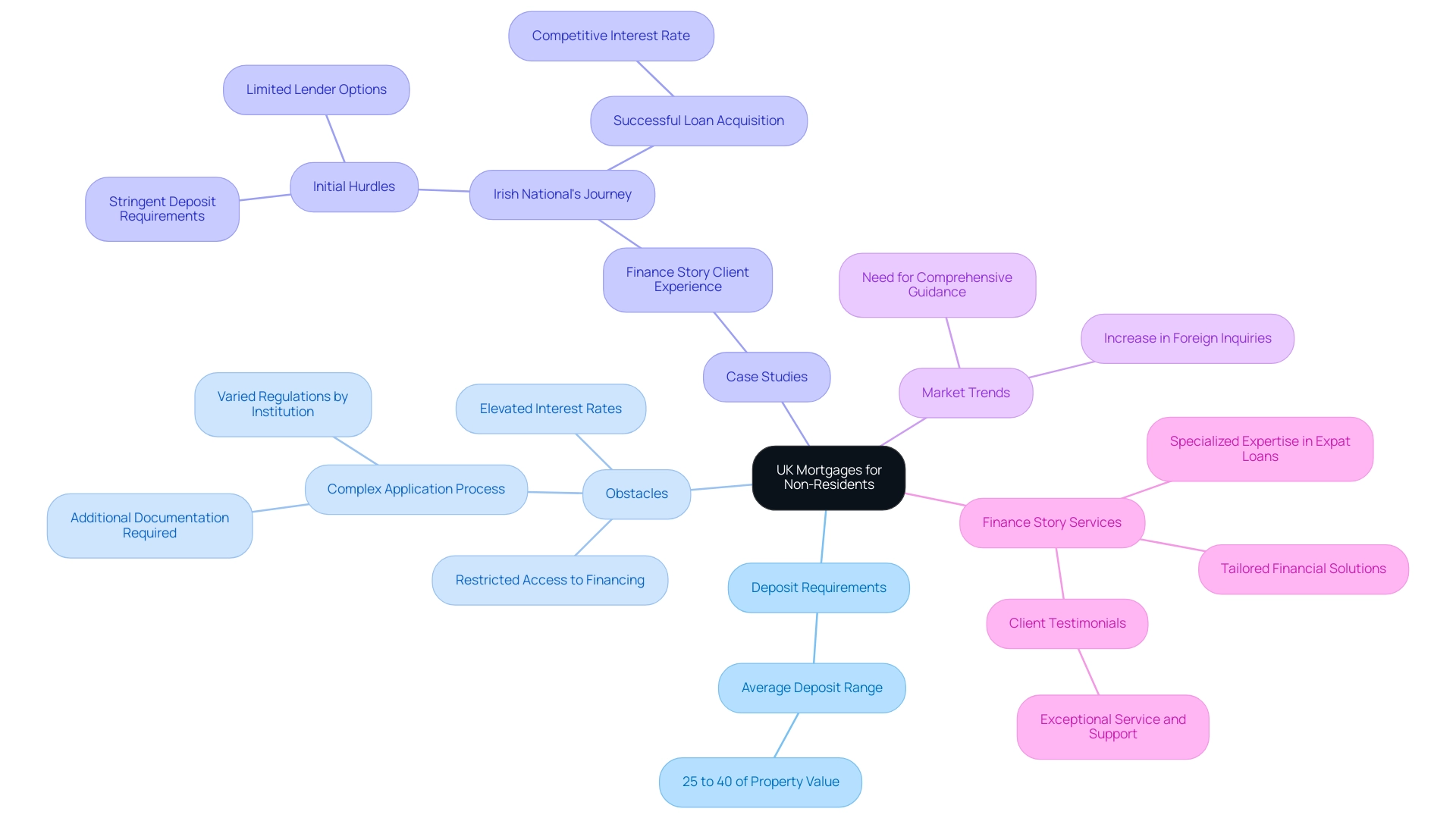
Exploring Mortgage Options for Non-Residents
Non-residents have access to a variety of loan options in the UK, including UK mortgage non-resident products such as residential loans, buy-to-let loans, and specialized offerings tailored for foreign investors. Residential loans are intended for individuals planning to occupy the property, whereas buy-to-let loans are suitable for investors seeking to generate rental income. In 2025, the environment for buy-to-let loans for foreign investors has become increasingly favorable, with a notable increase in gross advances, which rose by 29.9% compared to the prior year.
This growth indicates an expanding market that outsiders can take advantage of.
For individuals contemplating buy-to-let investments, it is essential to comprehend the specific criteria and advantages linked to these loans. Numerous financial institutions now provide attractive rates and adaptable conditions for foreign clients, indicating an increasing awareness of the opportunities in this market segment. Recent statistics indicate that a significant portion of non-resident buyers are leveraging these opportunities, especially through UK mortgage non-resident options, with many opting for buy-to-let financing as a strategic investment choice.
Specialist financial institutions play a pivotal role in this sector, providing tailored solutions for unique circumstances, such as expats or individuals with foreign income. These financial providers often have a deeper understanding of the challenges faced by individuals not residing in the country, allowing them to offer more flexible lending criteria. For example, Finance Story's groundbreaking borrowing process illustrates how access to a varied range of private investors and traditional monetary institutions can result in tailored loan solutions that satisfy the particular requirements of those living abroad.
This method is especially advantageous since numerous individuals, who are considered UK mortgage non-resident, encounter difficulties in obtaining funding, particularly due to current interest rates, which have led a third of borrowers to prolong their loans for home enhancements, as mentioned by Just Group.
Discussing your next home loan with Finance Story is as simple as 1, 2, 3. Save yourself the time and let us do all the hard work to find the very best value products on the market. Our team can meet with you at a time that suits your busy life and establish what is important to you about your next home loan.
With our knowledge and access to all the newest products readily available, we guarantee that you receive tailored guidance and assistance throughout the process.
Expert insights recommend that individuals who are UK mortgage non-residents should carefully compare various lenders and loan products to determine the best match for their financial circumstances. This approach not only enhances the chances of securing favorable terms but also ensures that clients are well-informed about their options. As the market evolves, staying updated on the latest trends and statistics is essential for making informed decisions.
Furthermore, a forthcoming statistical publication addressing claims on and liabilities to foreign entities by UK-based banks and building societies will offer additional insights into the market dynamics.
In summary, the housing landscape for individuals looking into a UK mortgage non-resident is abundant with opportunities, especially in the buy-to-let sector. By leveraging the expertise of specialized brokers like Finance Story and understanding the various products available, non-residents can navigate the complexities of securing a loan effectively.
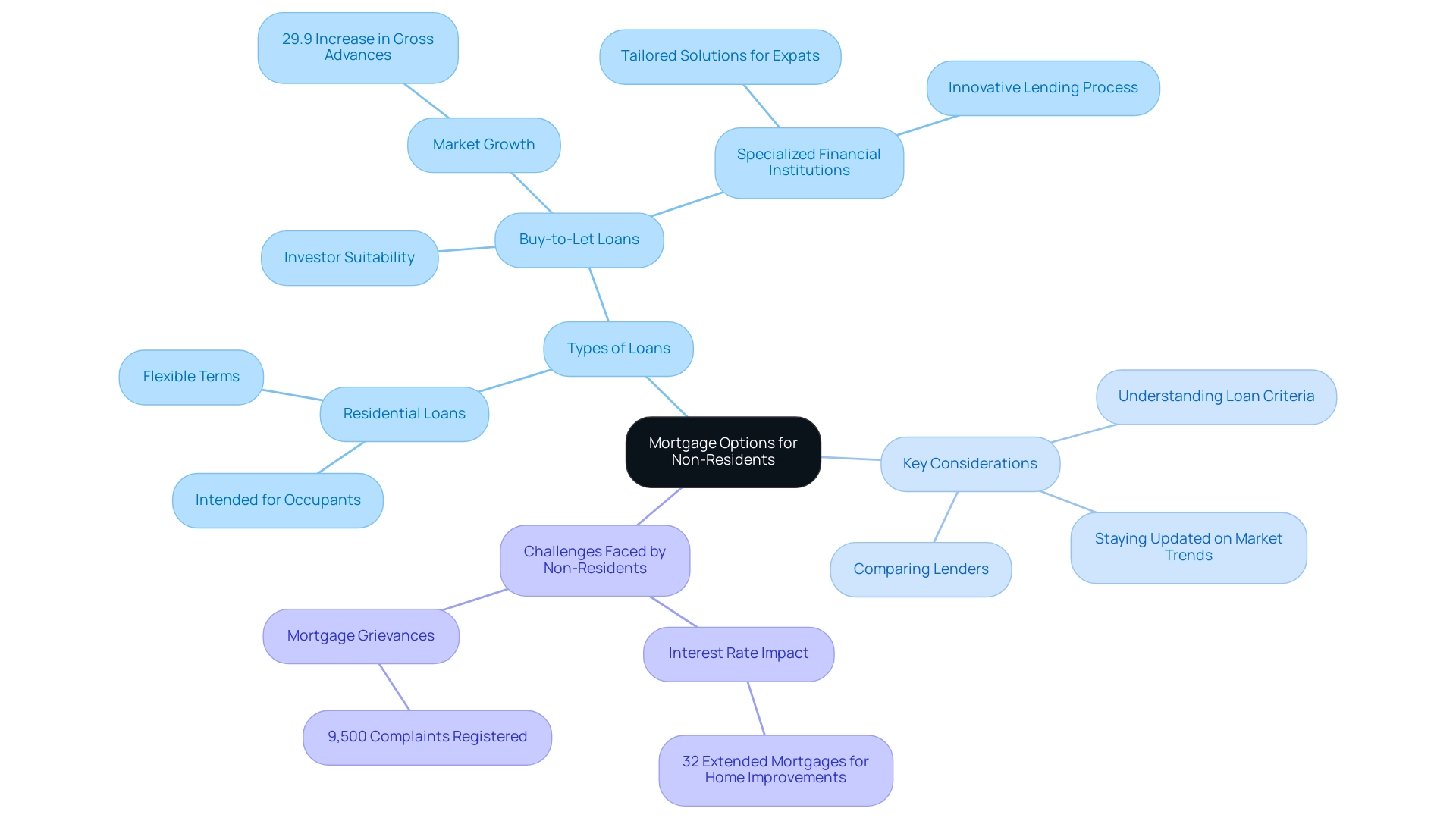
Eligibility Requirements for Non-Resident Mortgages
To qualify for a UK mortgage as a non-resident, applicants must navigate a specific set of criteria designed to evaluate their economic stability and investment potential. Financial institutions generally require proof of income, a solid credit history, and a significant deposit, typically at least 25% of the property's value. This deposit requirement reflects the increased risk associated with lending to non-residents for a UK mortgage. In addition to the deposit, applicants must provide essential documentation, including bank statements, tax returns, and proof of employment.
These documents assist creditors in assessing the applicant's economic status and capacity to repay the loan. It's crucial to note that some lenders may impose additional requirements based on the applicant's country of residence or the type of property being purchased, which can vary significantly.
Recent trends indicate a growing interest in expat home loans, particularly regarding UK mortgage options for non-residents, as the UK property market becomes increasingly accessible due to a weaker pound. In 2025, around 15% of loan requests came from expatriates, underscoring the rising need for customized financial solutions. The maximum loan amount for a mortgage is £2,000,000, providing substantial opportunities for individuals not residing in the country who wish to invest.
A notable case study from this year illustrates a UK citizen residing in Australia who successfully secured a buy-to-let loan as a UK mortgage non-resident, leveraging their overseas income and showcasing the potential for expatriates to invest in the UK property market with the right support. Experts, such as Dr. Nicola Powell from Domain, express confidence about the market's future, indicating that savvy investors can benefit from these economic strategies.
Expert opinions emphasize the importance of understanding these eligibility requirements. Financial advisors stress that those applying for a UK mortgage as a non-resident should be prepared to present comprehensive documentation and demonstrate their financial capability to enhance their chances of approval. By aligning with a knowledgeable loan brokerage like Finance Story, clients can experience streamlined home financing solutions with personalized assistance, making the process as easy as 1, 2, 3.
We invite potential clients to reach out to Finance Story for expert guidance and access to the best products available in the market, helping them navigate the complexities of securing financing for overseas property investments.
Navigating the Mortgage Application Process
Navigating the loan application process as a UK mortgage non-resident involves several essential steps to ensure a smooth experience. Start by collecting all required documentation, which generally consists of proof of income, identification, and detailed statements of accounts. This foundational step is crucial, as financiers require clear evidence of your financial standing.
Next, it’s important to research and select a financial institution that specializes in UK mortgage non-resident loans. Different financial institutions may provide various types of mortgages, such as fixed-rate, tracker, and standard variable rate options, each with distinct repayment plans. Selecting a financial institution with expertise in this niche can significantly impact your application’s success.
Once you have identified a suitable institution, submit your application along with the required documents. The lender will then carry out an affordability evaluation, which may entail further inquiries to clarify your monetary situation. This step is essential, as self-employed applicants must have been trading in their current role for at least 12 months to qualify for a loan.
If your application is approved, you will receive a loan offer. It is essential to examine this offer thoroughly, ensuring that the terms align with your monetary objectives before proceeding. The average time to process applications for a UK mortgage non-resident is currently estimated to be around 4 to 6 weeks, although this can vary based on the lender and the complexity of your application.
Expert insights suggest that the overseas rental property financing sector is expected to remain robust in 2025, driven by expatriates seeking investment opportunities in the UK. As highlighted by Dr. Nicola Powell, experts express confidence about the market's future, indicating that savvy investors can benefit from these financial strategies. Additionally, there is a growing demand for expat UK financing options, particularly among those looking to invest in properties.
Case studies indicate that with the increasing number of millionaires leaving the UK, the necessity for informed loan advisors has never been greater. Successful loan application stories for UK mortgage non-resident borrowers emphasize the importance of thorough preparation and understanding of the lending landscape, ensuring that applicants are well-equipped to navigate the complexities involved.
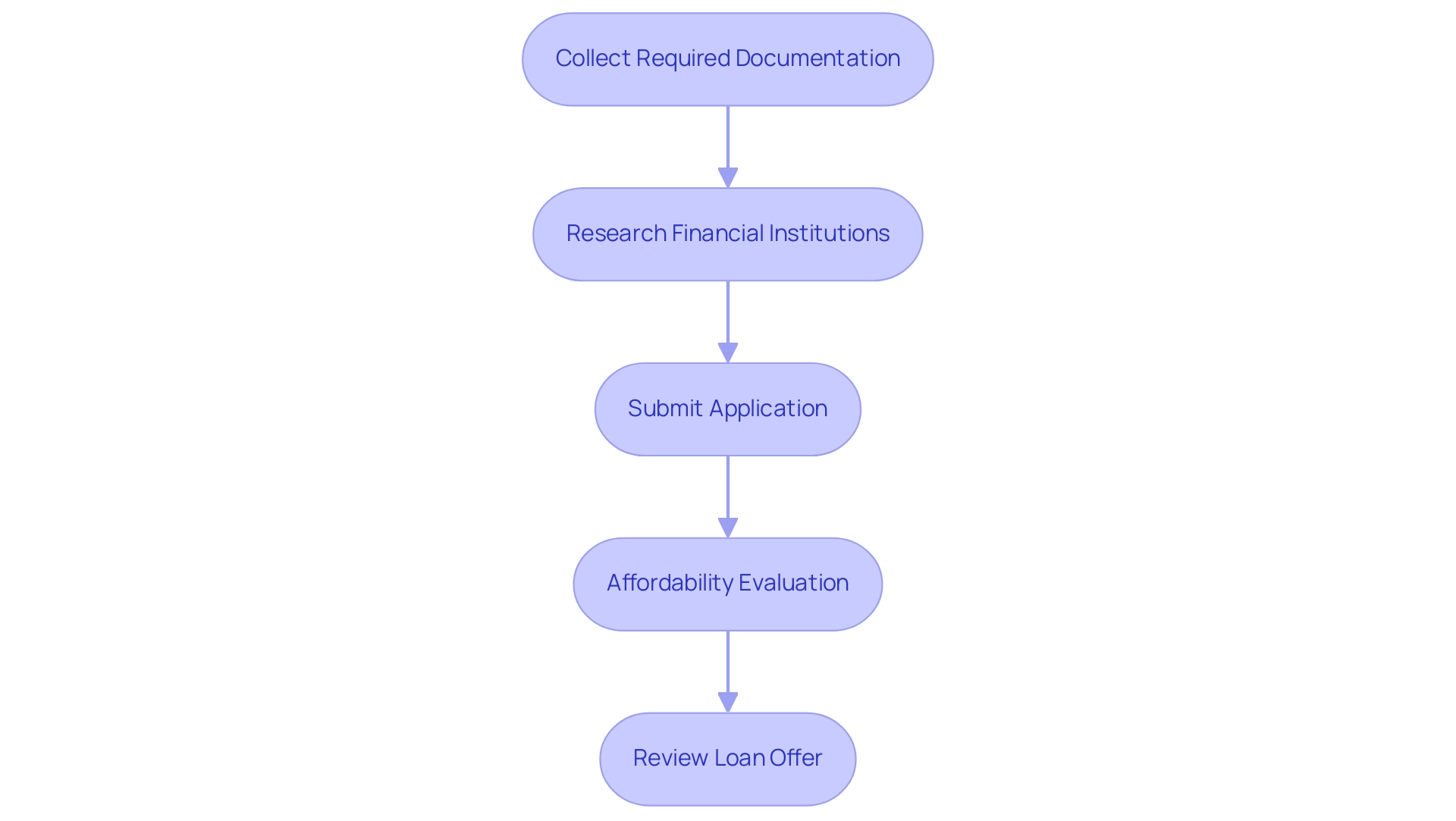
Financial Considerations: Deposits and Affordability
When considering a UK mortgage non-resident financing option, applicants should anticipate elevated deposit requirements, typically ranging from 25% to 40% of the property's value. This higher threshold reflects the perceived risk that financiers associate with UK mortgage non-resident borrowers. In addition to deposit expectations, lenders will conduct a comprehensive affordability evaluation to assess the applicant's capacity to manage loan repayments effectively.
This assessment encompasses various factors, including income, existing debts, and living expenses. Understanding these monetary considerations is crucial for enhancing approval chances. For instance, maintaining strong financial ties to the UK can significantly improve the likelihood of securing a loan. A case study involving UK nationals living overseas illustrates this point: applicants faced challenges such as higher interest rates and stringent documentation requirements. Yet, with expert guidance from Finance Story, they successfully navigated the process and obtained their desired loans.
Furthermore, current trends indicate that the loan approval landscape is evolving. In March 2024, the number of home loan approvals peaked at 61,325, marking a 1.4% increase from the previous month. This suggests a recovering market, despite remaining below pre-pandemic levels. Such context emphasizes the importance of aligning one's monetary situation with lender criteria to optimize approval chances.
Additionally, it is noteworthy that the number of UK loans with arrears rose by an average of 53 per day in the year to December 2023, highlighting the challenges present in the current lending market.
As finance reporter Bernadette Lunas emphasizes, "Understanding the complexities of the expat loan environment is vital for making informed monetary decisions." Consequently, potential borrowers seeking a UK mortgage non-resident should ensure their economic profiles align with lender expectations, thus improving their chances for successful loan applications. Finance Story offers personalized consultations and tailored mortgage solutions, ensuring clients access the best value products available.
Our commitment to building strong, long-term relationships with clients ensures they feel understood and supported in their financial decisions, making the process of securing a home loan as easy as 1, 2, 3.
The Role of Mortgage Brokers in Securing Financing
Mortgage brokers play a crucial role in assisting individuals from abroad with the complexities of securing a UK mortgage as non-residents for properties in the UK. With access to a diverse array of lenders and financing products tailored specifically for non-residents, brokers provide invaluable insights into the intricacies of the UK mortgage non-resident market. They not only streamline the application process but also enhance the likelihood of securing a suitable loan that aligns with the client's financial goals.
The benefits of utilizing a UK mortgage non-resident broker for non-resident mortgages are significant. Brokers possess a deep understanding of the eligibility criteria and documentation requirements that can be particularly stringent for those seeking a UK mortgage as non-residents. They guide clients through the necessary paperwork, ensuring that all documentation is complete and accurate, which is crucial for a successful application.
Furthermore, brokers leverage their relationships with lenders to negotiate favorable terms, potentially saving clients both time and money.
Successful case studies demonstrate the effectiveness of collaborating with loan brokers. For instance, an Irish buyer aiming to acquire a residential property in London encountered challenges because of the complexities of the UK financing landscape, including stringent eligibility criteria and the need for extensive documentation. With the assistance of Finance Story, the buyer successfully navigated these hurdles, demonstrating that international buyers can indeed secure financing for UK properties with the right support.
In 2025, the function of loan intermediaries for foreign buyers has become even more essential, especially as the UK housing market continues to evolve. Recent statistics indicate that loan approvals in the UK reached approximately 61,325 in March 2024, reflecting a growing interest in property investment among non-residents. This trend is further underscored by a 5.4% increase in buyers instructing home purchases, coupled with projected average house price rises of £84,000, highlighting the importance of having expert guidance in this competitive market.
Expert opinions consistently emphasize the benefits of working with a broker for UK mortgage non-resident financing. Brokers not only streamline the process but also offer customized guidance that can greatly influence the success of obtaining financing. Their professionalism and extensive knowledge of the finance sector position them as trusted allies for non-residents seeking UK mortgage non-resident options to invest in real estate.
As one satisfied client, Natasha B. from VIC, remarked, "I will definitely be recommending your business to anyone. We are finished with the constant worry. Once again, thank you so much for being a part of our journey."
This testimonial reinforces the effectiveness of Finance Story's services and their commitment to client satisfaction. Additionally, Finance Story's comprehensive portfolio of private and boutique commercial investors ensures that clients have access to a wide range of financing options, making the process even more streamlined and efficient.
Overcoming Challenges in Securing a Non-Resident Mortgage
Non-residents often encounter substantial obstacles when pursuing a UK mortgage. Stricter lending criteria, elevated deposit requirements, and limited access to certain financial institutions can complicate the process significantly. A key challenge is the lack of a UK credit history, which can adversely affect approval chances.
Statistics from 2025 reveal that non-resident loan application rejections remain notably high, with many lenders exercising caution when extending credit to individuals without established UK financial footprints. Historically, UK home loans are most frequently authorized between August and October, averaging around 67,000 approvals during this period. This statistic underscores the competitive environment that outsiders must navigate.
To effectively navigate these challenges, non-residents should consider partnering with a broker specializing in UK mortgage options for non-residents. Such brokers possess the expertise necessary to guide clients through the complexities of the application process and can connect them with lenders willing to consider their unique circumstances. Moreover, providing thorough documentation, including proof of income and stability, can significantly enhance the chances of approval.
Maintaining a robust credit profile is also essential. Non-residents should ensure that their financial history reflects responsible borrowing and timely repayments, even if this history is based outside the UK. Furthermore, being prepared to demonstrate economic stability through savings or assets can strengthen an application.
Expert insights emphasize the importance of comprehending the complexities of the expat loan environment, particularly concerning UK mortgage scenarios for non-residents. As finance reporter Bernadette Lunas articulates, "Understanding the complexities of the expat loan environment is vital for making informed financial decisions." This statement highlights the necessity for individuals not residing in the area to be well-informed about their options.
Case studies indicate that despite rising arrears in the UK housing loan market, over 99% of the 10.8 million loans are not in arrears, attributed to stringent affordability tests and a favorable labor market. This data suggests that with the right approach and support, individuals not living in the area can successfully secure mortgages and effectively navigate potential challenges. Additionally, recent adjustments by the PRA regarding firms' Pillar 2 requirements may influence lending practices, further underscoring the importance of staying informed about regulatory changes.
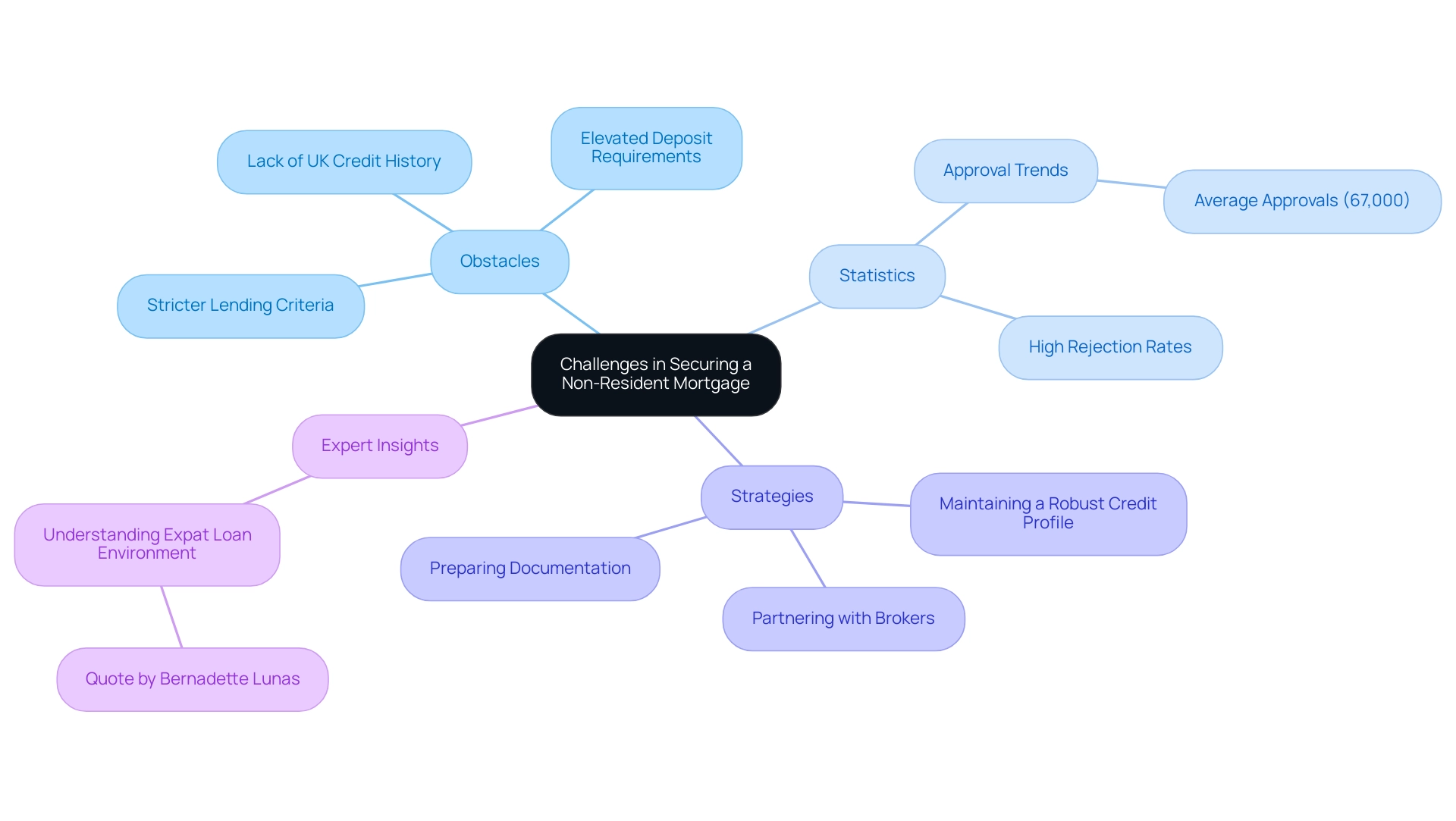
Legal and Tax Implications for Non-Residents
Purchasing property as a UK mortgage non-resident requires navigating a complex landscape of legal and tax implications. While individuals not residing in the UK are generally governed by the same property laws as UK residents, they encounter additional monetary obligations, particularly the Non-Resident Stamp Duty Land Tax (SDLT) surcharge. This surcharge can significantly impact the total cost of property acquisition.
To make informed investment decisions, it is crucial for individuals from outside the country to consult with legal experts specializing in UK property law. These professionals can provide valuable insights into various liabilities, including:
- Potential capital gains tax (CGT) obligations that may arise upon selling the property
- Inheritance tax (IHT) considerations that could influence estate planning
Furthermore, employees opting for the new 4-year scheme will continue to benefit from Overseas Workday Relief for earnings from job responsibilities conducted outside the UK—a significant factor for individuals living abroad to factor into their planning.
Recent developments indicate that the UK remains a favored destination for international investors, with ongoing discussions about aligning tax treatments for non-domiciled individuals. As Hed Amitai, a partner in the field, notes, "UK real estate has always attracted significant international investment." This evolving landscape underscores the importance of staying updated on current tax implications, particularly as the Multiple Dwellings Relief (MDR) will be withdrawn starting June 1, 2024—a change that could have substantial effects on property purchases for UK mortgage non-residents.
Case studies, such as that of Fifi, who sought a refund of the SDLT surcharge after an extended stay in the UK, illustrate the potential for financial relief when navigating these regulations. Fifi's experience highlights the necessity of timely action; she has until October 26, 2024, to amend her Stamp Duty Land Tax return and notify HMRC of her eligibility for a refund. This case reinforces the importance of understanding SDLT and the potential for refunds within the context of legal and tax considerations.
In summary, grasping the legal and tax implications of property ownership for UK mortgage non-resident individuals is essential for those not residing there. By engaging with knowledgeable professionals and remaining aware of the latest regulatory changes, non-residents can better position themselves to make sound investment choices in the UK property market.
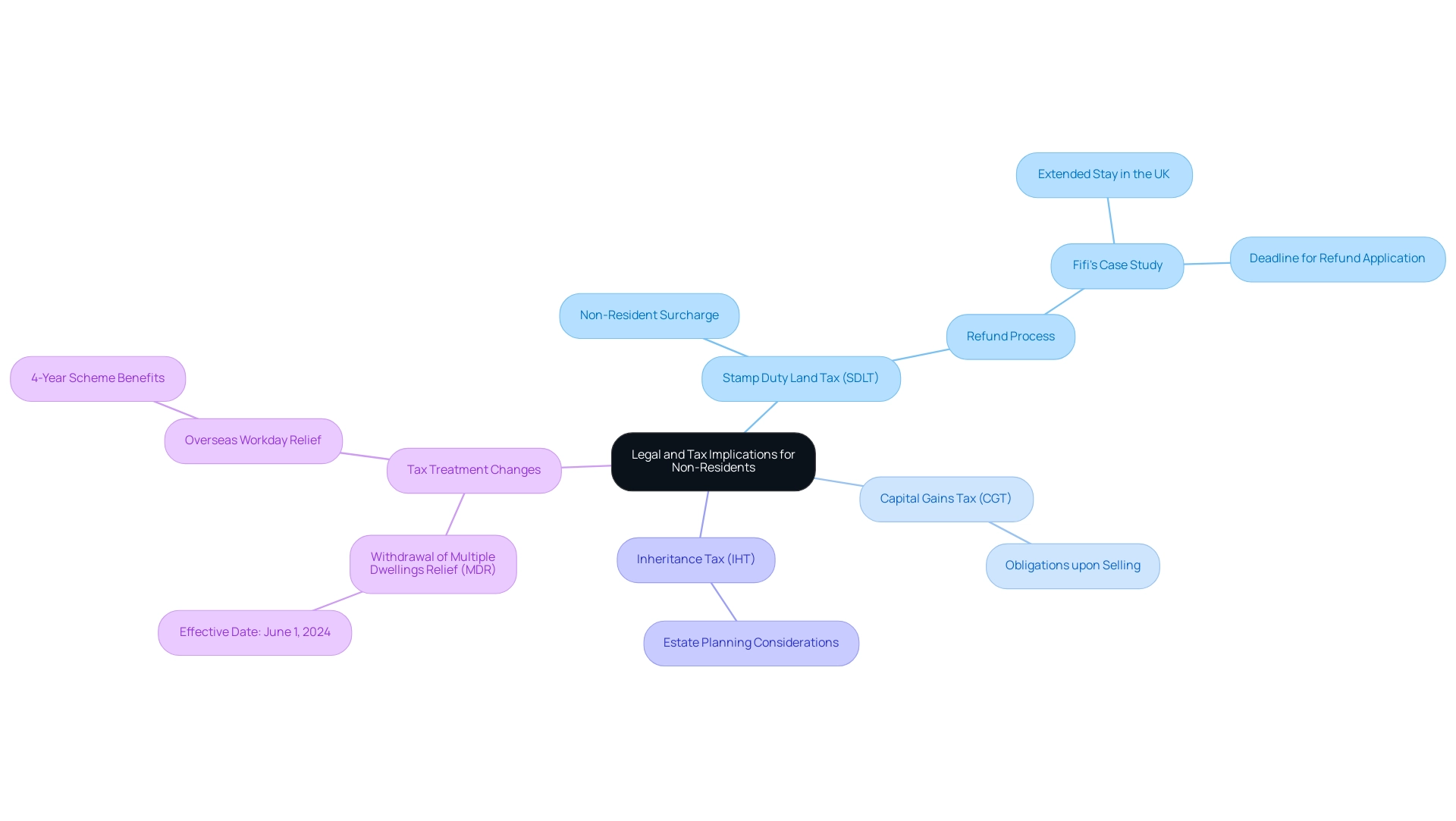
Key Takeaways for Non-Residents Seeking UK Mortgages
Non-residents aiming to secure a loan in the UK should follow these essential steps to navigate the process effectively:
- Understand the Unique Loan Landscape: Non-residents face a distinct lending environment influenced by factors such as currency fluctuations and differing lending criteria. Familiarizing oneself with these nuances is crucial.
- Explore Various Mortgage Options for UK Mortgage Non-Residents: A range of mortgage products is available for individuals living outside the country, including fixed-rate, variable-rate, and interest-only mortgages. Each option has its benefits and drawbacks, making it important to assess which aligns best with personal monetary goals.
- Familiarize Yourself with Eligibility Requirements for UK Mortgage Non-Residents: Lenders typically require those seeking a UK mortgage as a non-resident to meet specific criteria, including proof of income, credit history, and sometimes a larger deposit. Understanding these requirements can streamline the application process.
- Prepare for the Mortgage Application Process: Gathering necessary documentation—such as bank statements, tax returns, and identification—before applying can expedite the process. Non-residents should also be prepared for potential additional scrutiny from lenders.
- Consider Financial Implications: Non-residents should evaluate the financial aspects of securing a UK mortgage, which includes deposit sizes, interest rates, and overall affordability. With the Bank of England maintaining a base rate of 5.25% as of May 2024, understanding how this affects loan costs is essential. Historical data reveals fluctuations in loan approvals from 2013 to 2024, indicating how economic conditions can affect the market.
- Utilize the Expertise of Loan Brokers: Engaging a knowledgeable loan broker can provide invaluable assistance. Brokers can help navigate the complexities of the UK loan market, identify suitable lenders, and negotiate favorable terms. Finance Story is committed to building strong, long-term relationships with clients, ensuring they feel understood and supported throughout the mortgage process. To further enhance your experience, we invite you to schedule your free personalized consultation with Shane Duffy, our Head of Funding Solutions. Booking is easy with our live calendar, allowing you to select a time that suits your busy life. This 30-minute meeting will allow you to discuss your specific needs and goals, ensuring you receive tailored financial strategies and access to the best products available.
- Be Aware of Potential Challenges: Non-residents may encounter hurdles such as limited lender options or higher interest rates when applying for a UK mortgage. Being proactive in addressing these challenges can lead to a smoother experience.
- Understand Legal and Tax Implications: It is vital for individuals not living in the country to comprehend the legal and tax responsibilities associated with property ownership in the UK. This encompasses understanding stamp duty, capital gains tax, and any implications of owning property as a person not residing in the country.
By following these steps, UK mortgage non-resident individuals can improve their chances of successfully obtaining financing for property investments in the UK. The mortgage landscape is evolving, and staying informed about current trends and statistics, such as the average age to pay off a mortgage in the UK now being 65 according to Just Group, can provide further insights into the market dynamics. Additionally, upcoming statistical releases covering claims on and liabilities to non-residents by UK-resident banks and building societies will be crucial for understanding the evolving nature of the market.
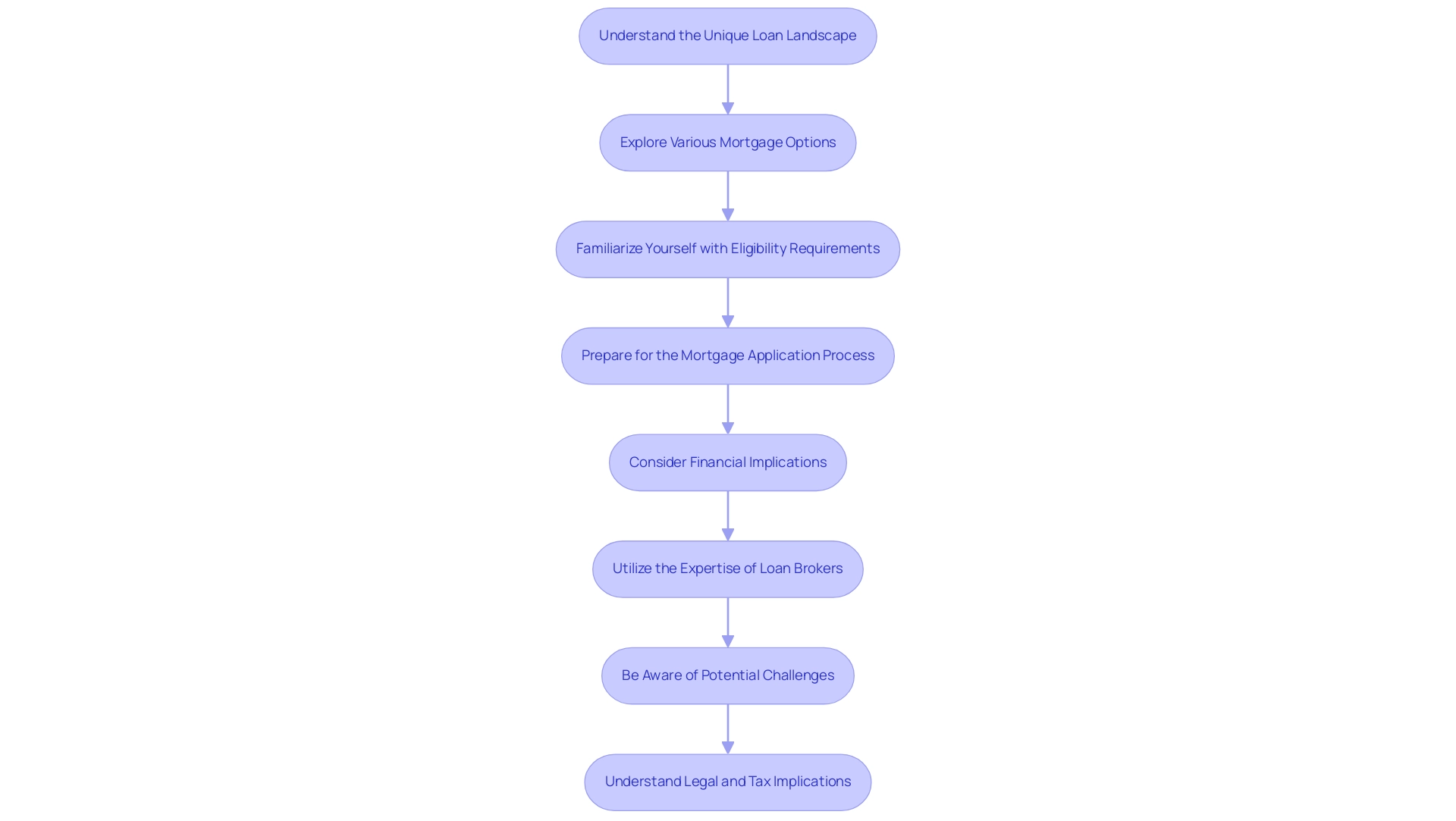
Conclusion
Navigating the UK mortgage landscape as a non-resident offers both unique opportunities and challenges. Understanding the distinct mortgage requirements—such as higher deposit expectations and stringent eligibility criteria—is crucial for international investors. By familiarizing themselves with various mortgage options, including residential and buy-to-let mortgages, non-residents can better position themselves to make informed financial decisions that align with their investment goals.
The role of specialized mortgage brokers is paramount. Their expertise in the complexities of the non-resident mortgage market is invaluable, providing tailored guidance that enhances the likelihood of securing favorable terms. Furthermore, as the market evolves, staying informed about the latest trends, legal implications, and financial responsibilities is essential for non-residents looking to invest in UK property. Engaging with knowledgeable professionals ensures that potential buyers navigate the process efficiently and effectively.
Ultimately, the UK property market remains an attractive destination for non-resident investors. With the right preparation, support, and understanding of the mortgage landscape, securing financing for property investments can be a successful endeavor. By proactively addressing potential challenges and leveraging expert resources, non-residents can unlock the door to fruitful property ownership in the UK.




